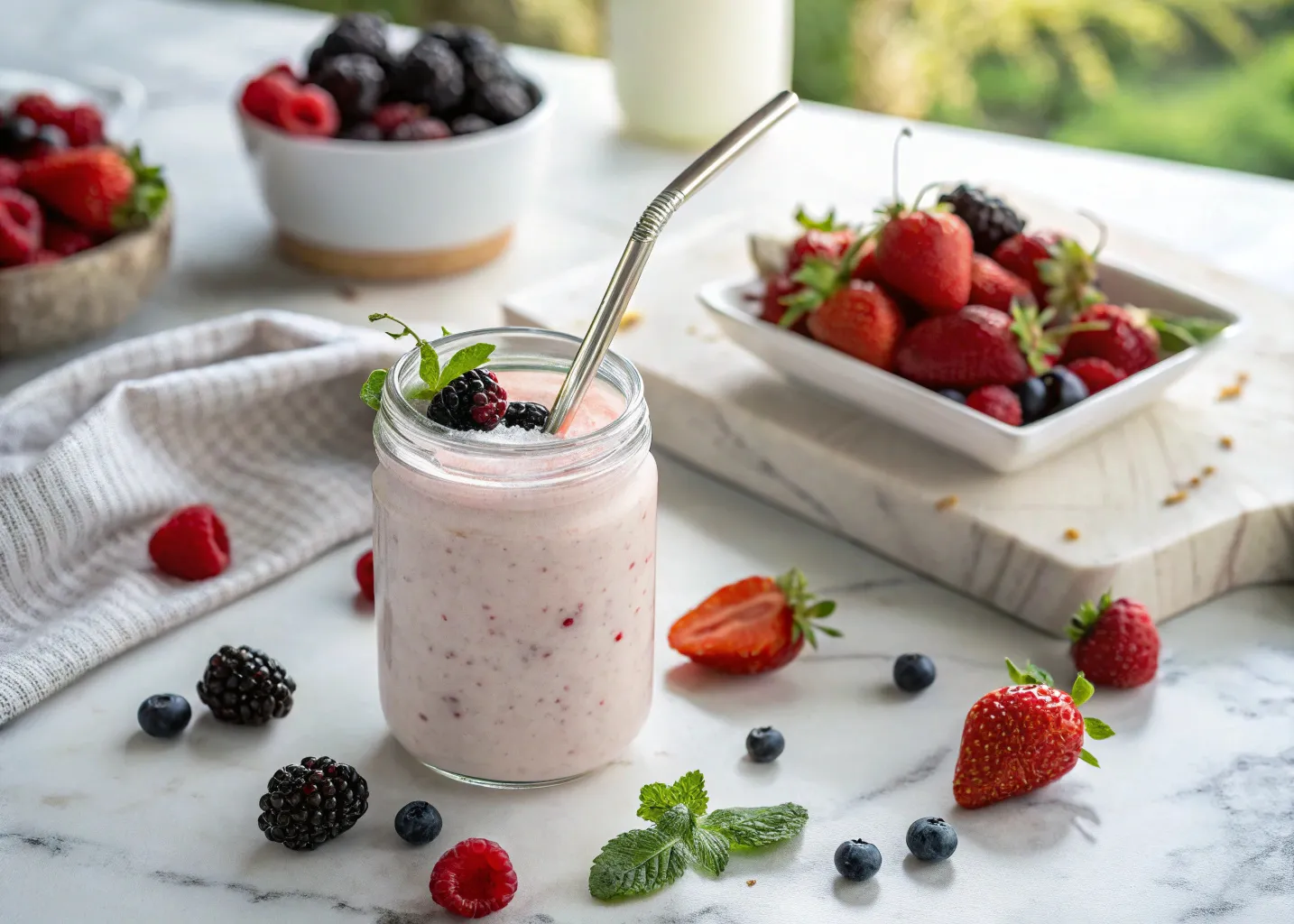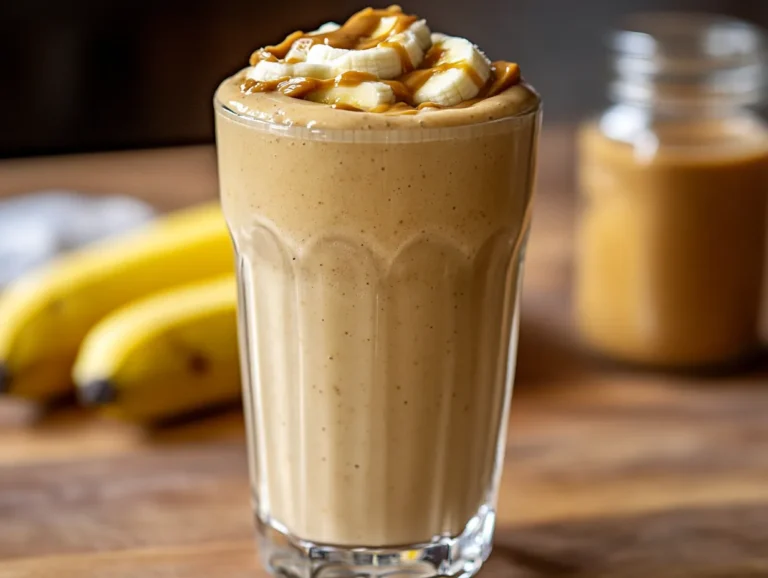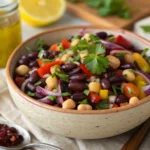If you’re looking for a quick, healthy, and incredibly satisfying breakfast or snack, look no further than the Greek yogurt smoothie. Packed with protein, naturally creamy, and endlessly customizable, it’s one of the best ways to kickstart your day or refuel post-workout. Whether you’re aiming for weight loss, muscle gain, or simply better nutrition, Greek yogurt smoothies hit the mark.
In this guide, you’ll learn why Greek yogurt is a game-changer for smoothies, how to build your own blend from scratch, and what ingredients pair best to deliver flavor and fuel. We’ll also cover tips, add-ins, recipes, and answers to the most asked questions—so your next smoothie isn’t just healthy, it’s unforgettable.
Why Greek Yogurt Smoothies Are a Smart Choice
What Makes Greek Yogurt Perfect for Smoothies
Let’s be clear: not all yogurts are created equal. Greek yogurt is the gold standard when it comes to blending a smoothie that’s both creamy and nourishing. Unlike regular yogurt, Greek yogurt is triple-strained, giving it a thicker texture and higher protein count. That dense, silky consistency? It turns any smoothie into a satisfying meal replacement.
More importantly, Greek yogurt isn’t just about texture. It has a naturally tangy flavor that balances out the sweetness of fruits, which means you can skip sugary juices or syrups and still get a vibrant, rich-tasting drink. It’s an easy, whole-food way to make your smoothies more filling and functional.
Nutritional Benefits: Protein, Calcium & Probiotics
Here’s the real reason Greek yogurt smoothies are more than just a trend: they’re nutritional powerhouses. Let’s break it down.
| Nutrient | Amount (6 oz Greek Yogurt) | What It Does |
|---|---|---|
| Protein | 15–20g | Builds muscle, keeps you full |
| Calcium | ~200mg | Supports bone and dental health |
| Probiotics | Varies | Improves digestion and gut health |
| Vitamin B12 | Moderate | Boosts energy and brain function |
| Potassium | Moderate | Aids in heart and muscle function |
When you add Greek yogurt to your smoothie, you’re not just making it tastier—you’re making it smarter. It transforms a basic fruit drink into a balanced meal option that works for breakfast, post-workout, or even as a healthy dessert.
According to Healthline, Greek yogurt is rich in probiotics, protein, calcium, and B12—all of which support digestive, muscular, and bone health.
How to Make a Greek Yogurt Smoothie from Scratch
Essential Ingredients You’ll Need
The beauty of a Greek yogurt smoothie is its flexibility. You can keep it simple or build a flavor bomb using just a few kitchen staples. Here’s a foundational setup to get you started:
- ½ cup plain Greek yogurt (full-fat for creaminess, low-fat for calorie-conscious)
- 1 cup fresh or frozen fruit (think bananas, berries, mango)
- ½ cup liquid (water, almond milk, oat milk, or low-sugar juice)
- Optionally: add 1 teaspoon of honey or maple syrup for natural sweetness.
- Add-ins: chia seeds, flax, vanilla extract, oats, nut butter
Whether you want your smoothie rich and indulgent or light and refreshing, you’ve got the flexibility to shape it your way.
Simple Step-by-Step Instructions for a Perfect Blend
Making a Greek yogurt smoothie at home doesn’t require any special skills—just a blender and five minutes. Follow this foolproof method:
- Start with the liquid – It helps the blades move freely.
- Add Greek yogurt – For creaminess and body.
- Toss in fruits – Fresh or frozen both work great.
- Add-ins and sweeteners – Drop them in last.
- Blend until smooth – Usually takes 30 to 60 seconds.
Once blended, pour it into your favorite glass, jar, or to-go cup. You can top it with a sprinkle of granola, extra fruit slices, or a drizzle of honey if you like.
Pro tip: Want a thicker smoothie bowl-style texture? Use frozen fruit and reduce the liquid. You’ll need a strong blender, but the spoonable payoff is worth it.
Best Fruits to Mix with Greek Yogurt
Top Flavor Pairings for Sweet and Tangy Results
Greek yogurt has a naturally tangy profile, which makes it a perfect match for sweet, vibrant fruits. Whether you’re going for a refreshing morning boost or a post-workout refuel, the right fruit makes all the difference in taste and nutrition.
Here are the top fruits that blend beautifully with Greek yogurt:
- Banana – Adds creaminess and natural sweetness
- Strawberries – Balances tart yogurt with bright, sweet notes
- Blueberries – Antioxidant-rich and subtly sweet
- Mango – Tropical, juicy, and full of vitamins
- Pineapple – Offers a bold citrus twist and helps digestion
- Peach – Naturally sweet and juicy with a smooth, mellow flavor.
- Raspberries – Adds a berry punch with a little tang
- Apple (pre-cooked or finely chopped) – Adds fiber and a fall flavor vibe
Pairing these fruits with Greek yogurt creates natural harmony—you’ll get sweetness without needing added sugars.
Seasonal Fruit Options for All-Year Variety
Not every fruit is in season year-round—but that doesn’t mean your smoothie has to suffer. Here’s how to rotate your fruit choices based on availability:
| Season | Fruit Options |
|---|---|
| Spring | Strawberries, kiwi, pineapple |
| Summer | Blueberries, peaches, mango, blackberries |
| Fall | Apples, pears, figs (pre-soaked or chopped) |
| Winter | Bananas, frozen berries, mandarins |
Frozen fruits are also excellent—they’re harvested at peak ripeness and flash-frozen to lock in nutrients. So even in winter, you can blend like it’s July.
Creative Add-Ins to Boost Flavor and Nutrition
Healthy Extras: Seeds, Spices, and Natural Sweeteners
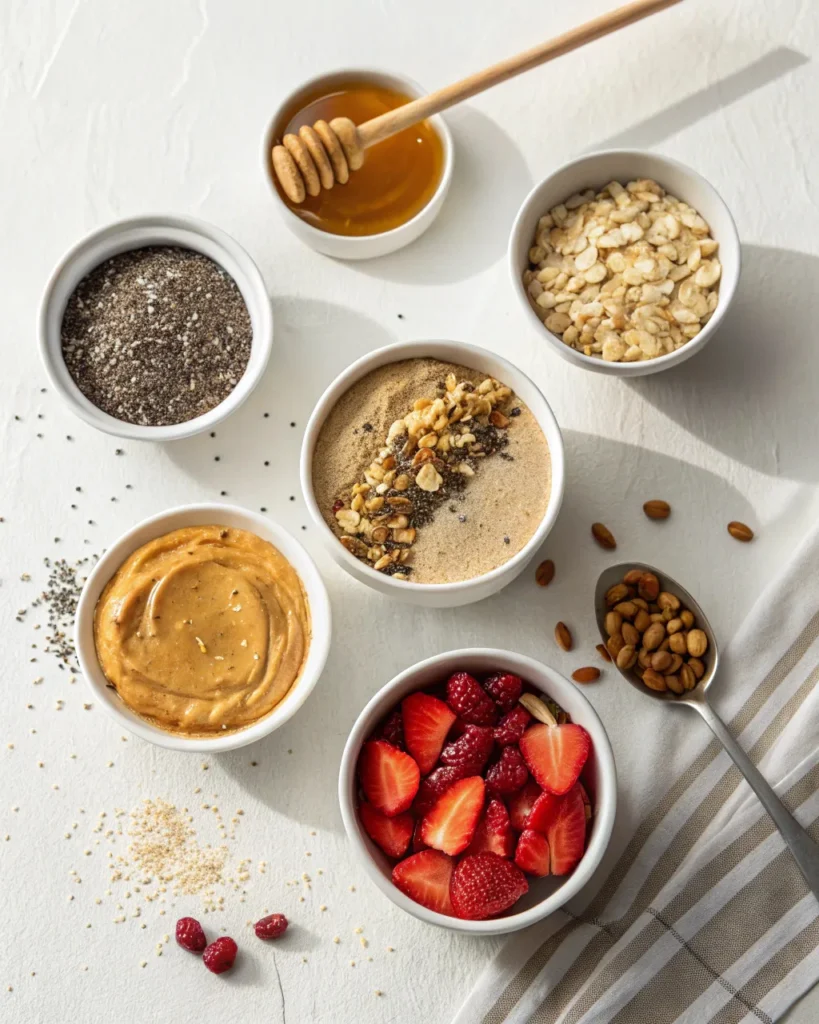
A great Greek yogurt smoothie isn’t just about the fruit. It’s the little extras that transform it from a snack into a superfood blend. Here are ingredients that add both flavor and functionality:
- Chia seeds – Adds fiber, omega-3s, and thickens your smoothie
- Flaxseed meal – Earthy flavor + heart-healthy fats
- Rolled oats – For a breakfast smoothie that keeps you full
- Honey or maple syrup – Natural sweeteners with a flavor punch
- Cinnamon or nutmeg – Add warmth and complexity
- Turmeric – Anti-inflammatory and subtle spice (pair with mango or banana)
These additions don’t just taste good—they supercharge your blend with nutrients, antioxidants, and plant-based energy.
Flavorful Enhancers: Vanilla, Peanut Butter, and More
Sometimes, just a drop or spoonful of the right flavor can elevate a basic smoothie into a crave-worthy one. Here are some of the best flavor enhancers:
- Vanilla extract – Adds dessert-like aroma and richness
- Peanut butter or almond butter – Creamy, nutty, and packed with protein
- Cocoa powder – For a chocolatey twist without sugar
- Coconut flakes – For a tropical texture
- Matcha powder – A caffeine kick with antioxidant power
- Greek yogurt with honey or vanilla flavor – If you prefer pre-sweetened yogurt, this is a game-changer
The goal isn’t to overwhelm the smoothie but to layer flavors for a balanced and deeply satisfying blend. One or two of these can totally reshape the taste.
Protein Power – How Much Is in Greek Yogurt Smoothies?
Understanding the Protein Content in Greek Yogurt
One of the top reasons Greek yogurt is so popular in smoothie recipes? Protein. It’s not just a little boost—it’s a full meal’s worth, especially when you’re using ½ to 1 cup per serving.
Here’s a look at what you’re getting per 6-ounce (170g) serving of plain Greek yogurt:
- 15–20 grams of protein
- 120–150 calories (depending on fat content)
- Low sugar, high satisfaction
Compare that to traditional yogurt, which averages just 9 grams of protein per serving, and you’ll see why Greek yogurt is in a league of its own.
When blended with fruits, oats, and extras like nut butter or seeds, your smoothie can easily pack 20–30 grams of protein—ideal for post-workout recovery, muscle repair, or simply staying full longer.
Looking for more high-protein dairy treats? Try this easy cottage cheese cookie dough recipe for a no-bake snack packed with protein.
Comparing Greek Yogurt Smoothies with Other Protein Sources
Greek yogurt smoothies hold up well against other common protein options. Let’s look at the numbers:
| Food | Protein (per serving) | Prep Time | Best For |
|---|---|---|---|
| Greek yogurt smoothie | 20–30g | 3–5 mins | Post-workout, breakfast |
| Protein shake (powder + water) | 20–25g | 2 mins | After gym |
| Scrambled eggs (2 large) | 12g | 10 mins | Breakfast |
| Chicken breast (3 oz) | 26g | 15–20 mins | Lunch/dinner |
But here’s the bonus: a Greek yogurt smoothie brings more than protein. You’re also getting fiber, calcium, antioxidants, and probiotics, all in one glass.
For busy mornings, smoothie meal prep, or fueling up after a run, it’s a cleaner and more nourishing choice than relying solely on powders or animal protein.
Tips for Blending the Perfect Texture
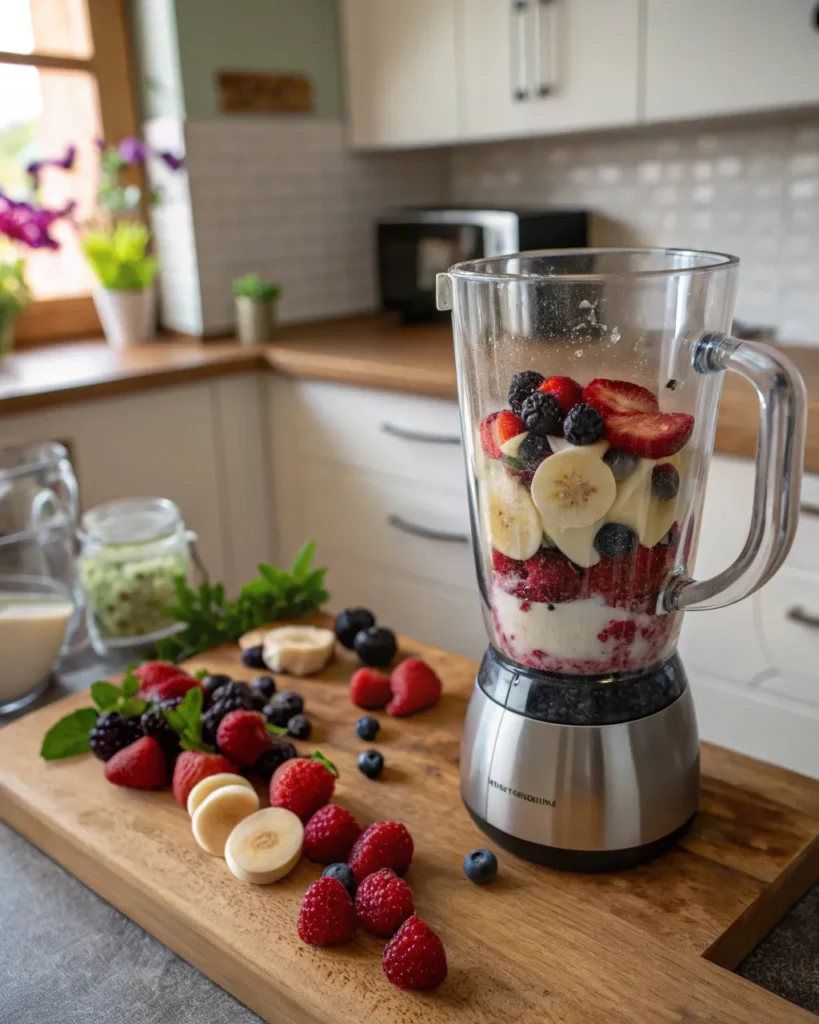
Choosing the Right Blender for Smooth Results
Nobody likes a chunky smoothie. And while Greek yogurt is naturally creamy, the right blending technique makes all the difference.
Here’s what to consider:
- Blender power: Go for 600+ watts for frozen fruit and nuts
- Blade sharpness: Dull blades struggle with seeds or thick textures
- Jar shape: Narrow bases pull ingredients into blades more efficiently
Recommended blenders for great texture:
- NutriBullet Pro – Compact, budget-friendly, smoothie-focused
- Ninja Professional Blender – Great for families or batch prep
- Vitamix Explorian – Premium choice with silky results
If you’re blending daily, the investment is worth it. You’ll save money and get a smoother finish every time.
How to Fix a Smoothie That’s Too Thick or Too Thin
Let’s troubleshoot common texture problems:
- Too thick? Add liquid slowly—just 1–2 tablespoons at a time. Try almond milk, water, or even green tea.
- Too thin? Toss in frozen banana slices, more Greek yogurt, or oats. A handful of ice also works.
- Too icy? Use a mix of fresh and frozen fruit. Let frozen fruits thaw slightly before blending.
- Too gritty (seeds, oats)? Blend in two rounds—start with dry items and yogurt first, then add liquids and fruits.
Pro tip: Place Greek yogurt near the bottom of the blender to hit the blades first—this helps create a smooth, creamy base before adding other ingredients.
Delicious Greek Yogurt Smoothie Recipes to Try
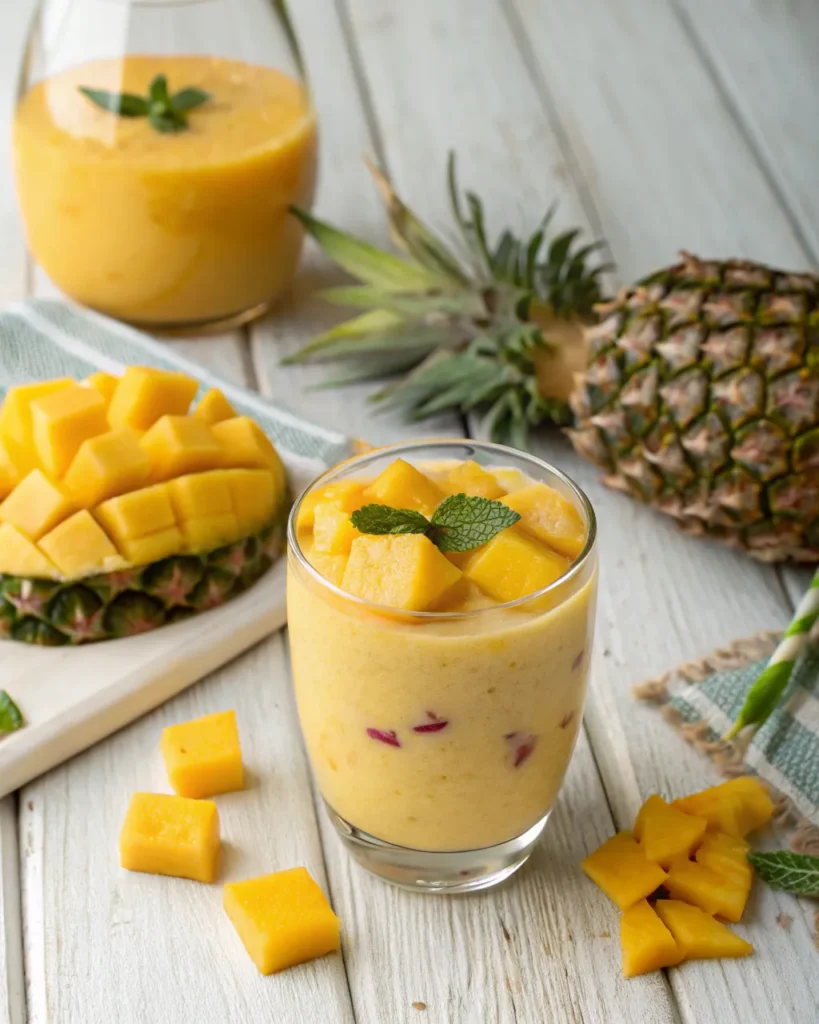
Once you’ve mastered the basics, it’s time to mix things up. These two go-to Greek yogurt smoothie recipes are rich in flavor, high in nutrition, and quick to make. Stick to the formula or customize with your favorite fruits and boosters.
Tropical Sunrise Smoothie
This bright, citrusy smoothie tastes like a beach vacation in a glass. Great for mornings or midday pick-me-ups.
Ingredients:
- ½ cup plain Greek yogurt
- ½ banana (frozen or fresh)
- ½ cup mango chunks
- ½ cup pineapple chunks
- ½ cup coconut water or almond milk
- 1 teaspoon honey (optional)
- A squeeze of lime juice
Instructions:
- Add liquid to the blender first.
- Add Greek yogurt, fruits, and optional honey/lime juice.
- Blend on high until smooth.
- Serve and garnish with a hint of lime or a few fresh mint leaves for a refreshing twist.
Why it works: Mango and pineapple offer tropical sweetness, lime brightens the flavors, and Greek yogurt brings it all together with creaminess and protein.
Berry Powerhouse Smoothie
Loaded with antioxidants and protein, this blend is ideal for post-workout recovery or breakfast on the go.
Ingredients:
- ½ cup Greek yogurt
- ½ cup strawberries
- ¼ cup blueberries
- ¼ cup raspberries
- ½ banana
- ½ cup oat milk or almond milk
- 1 tablespoon chia seeds
Instructions:
- Add all ingredients to blender.
- Let the chia seeds soak in the liquid for 2 minutes.
- Blend until smooth.
- Top with extra berries or a few oats for crunch.
Pro tip: For a thicker version, freeze the banana and berries before blending.
Health Tips and Dietary Considerations
Low-Sugar and Low-Calorie Greek Yogurt Smoothie Tips
Watching your sugar intake or calorie count? You can still enjoy Greek yogurt smoothies without compromising your goals.
Here’s how:
- Use unsweetened Greek yogurt – It avoids hidden added sugars.
- Skip fruit juices – They spike sugar levels. Use water, almond milk, or coconut water instead.
- Opt for low-sugar fruits—berries like raspberries and blackberries are excellent choices.
- cinnamon or vanilla for a hint of natural sweetness—no added sugar needed.
- Skip flavored yogurts – Even “vanilla” yogurts often have added sugar. Use plain and flavor it yourself.
Making It Vegan or Dairy-Free (Using Alternatives)
While Greek yogurt is dairy-based, you can still enjoy Greek yogurt-style smoothies even if you’re lactose intolerant or vegan.
Try these alternatives:
| Swap For | Use This Instead |
|---|---|
| Greek yogurt | Almond, coconut, oat, or soy yogurt |
| Cow’s milk | Almond milk, oat milk, coconut water |
| Honey | Maple syrup or agave |
Many plant-based yogurts now come with added protein too—especially soy or almond-based ones. Just read the label and go for unsweetened varieties with live active cultures to still get that probiotic benefit.
Bonus tip: Add a small scoop of vegan protein powder to keep your smoothie balanced and satiating.
Greek Yogurt Smoothie FAQs Answered
Is Greek yogurt good for smoothies?
Definitely. Greek yogurt makes an excellent base for smoothies due to its rich protein content, thick and creamy texture, and naturally tangy taste. It adds body to your blend without relying on bananas or ice cream and keeps you satisfied longer—perfect for healthy breakfasts or recovery shakes.
How to make smoothies with Greek yogurt?
Making a Greek yogurt smoothie is easy. Blend together:
- ½ cup plain Greek yogurt
- 1 cup fruit (fresh or frozen)
- ½ cup liquid (water, nut milk, etc.)
- Add-ins like oats, chia seeds, or sweeteners (optional)
Blend on high for 30 to 60 seconds until fully smooth. If needed, adjust the consistency by adding extra liquid or frozen fruit.
Can you put Greek yogurt in a blender?
Yes, Greek yogurt blends beautifully. It’s smooth, thick, and helps create a velvety texture when combined with fruits and liquids. Whether you’re using a personal-size blender or a full-power model, Greek yogurt breaks down easily and enhances consistency.
What fruits to mix with Greek yogurt?
Some of the best fruits for Greek yogurt smoothies include:
- Bananas
- Strawberries
- Blueberries
- Mango
- Pineapple
- Raspberries
Each brings unique flavor and nutritional value. Combining fruits like banana + berries or mango + pineapple creates a balanced, sweet-and-tangy blend.
What is the healthiest fruit for smoothies?
Blueberries are often considered the healthiest fruit for smoothies due to their antioxidant content, fiber, and low glycemic index. They pair exceptionally well with Greek yogurt and add deep flavor without excess sugar.
How much protein is in Greek yogurt?
A typical 6-ounce serving of plain Greek yogurt delivers around 15 to 20 grams of protein. Used as a smoothie base, it provides a strong protein boost that aids muscle recovery, supports metabolism, and helps you stay full longer. For even more protein, try blending in chia seeds, flax, or a spoonful of nut butter.
Conclusion
Whether you’re powering up for the day, refueling after a workout, or just craving something cold and creamy, a Greek yogurt smoothie delivers flavor, function, and flexibility in every sip. It’s the perfect way to blend nutrition and satisfaction into one easy meal or snack.
Start simple, experiment with fruit pairings, and upgrade your blend with add-ins like chia, vanilla, or nut butters. Greek yogurt gives you the base—you bring the creativity.
Don’t miss our creamy cottage cheese chocolate mousse—another smart, high-protein dessert for your wellness routine.
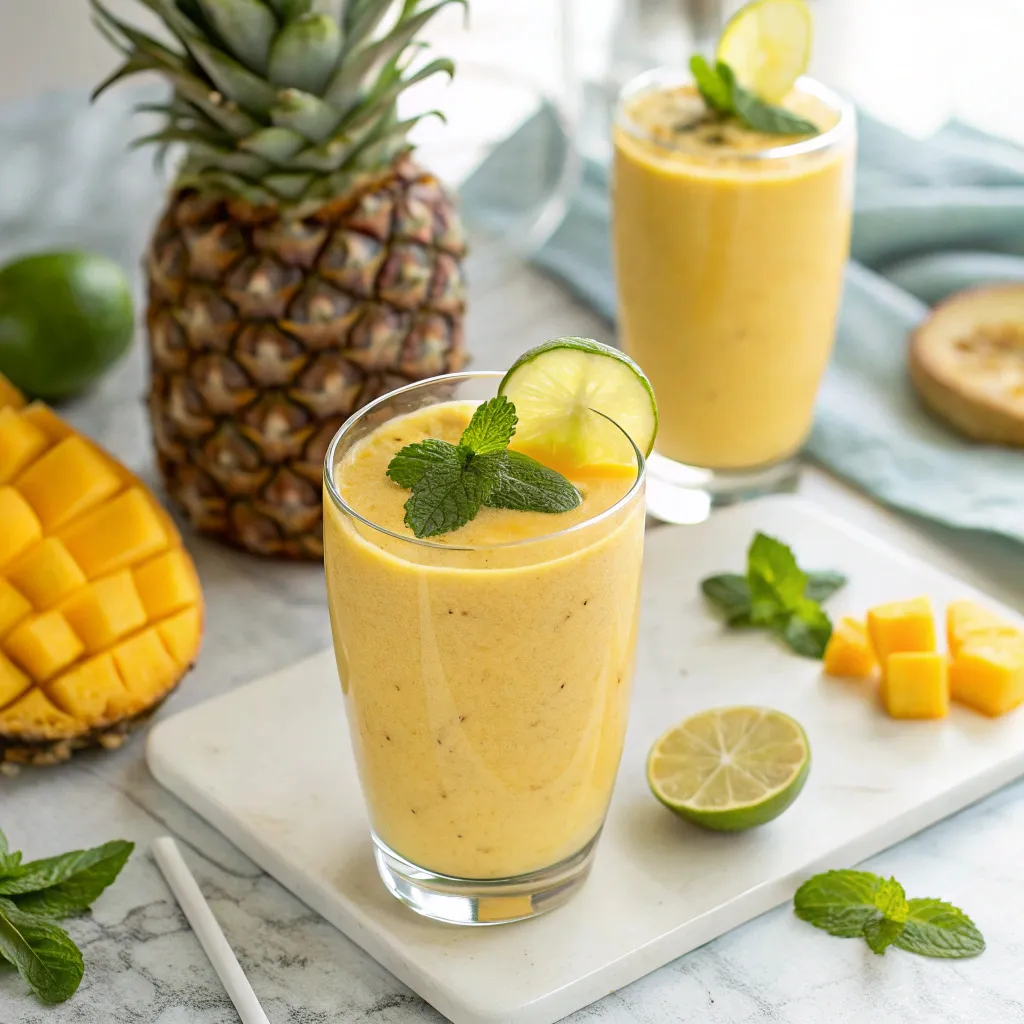
Tropical Greek Yogurt Smoothie
Ingredients
Equipment
Method
- Add liquid to blender first – This helps the blades move smoothly.
- Add yogurt, banana, mango, and pineapple.
- Add honey and lime juice, if using.
- Blend on high for about 60 seconds or until creamy and smooth.
- Serve immediately with a slice of lime or fresh mint, if desired.
Notes
- Use frozen fruit for a thicker texture.
- Swap coconut water with almond milk for a creamier finish.
- For more protein, add chia seeds or a spoonful of peanut butter.


